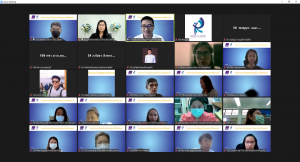
On March 31, 2565, Dr.Prin Boonkanit, Vice President for Administration, Research, and Innovation at RMUTP, chaired the opening of the training program “The Importance of Human Research Ethics” via the online platform Zoom. The event was organized by the Research and Development Institute of RMUTR and aimed to provide valuable insights into research ethics concerning human subjects. The training aimed to inform researchers about the significance of ethical considerations in human research, ensuring that research planning adheres to international human research ethics principles and is eligible for ethical review in future research project submissions.
The seminar was honored by the presence of Associate Professor Dr. Sirilak Thiraput, Deputy Chairperson of the Human Research Ethics Committee at Naresuan University, who served as a lecturer. The training covered topics such as “Basic Ethical Principles & Evolution of Human Research Ethics,” “Risk & Benefit Analysis,” “Privacy and Confidentiality,” “Conflicts of Interest,” and “Informed Consent Overview.” The training garnered attention from teachers, researchers, and personnel from various fields, totaling 1,149 participants from 187 organizations nationwide. This included both public and private educational institutions, research networks, the Basic Education Commission, Ministry of Public Health, nursing colleges, schools, and district offices.
Dr.Prin Boonkanit highlighted that within the university’s development strategy, RMUTR aims to enhance research efficiency and effectiveness. The university supports specialized research teams in attaining national and international recognition, producing high-quality research work, and expanding collaborative networks with external organizations. The university also encourages interdisciplinary research and teamwork. It is anticipated that participants will benefit from the training by increasing their research capacity and effectiveness, leading to improved quality of research work and greater support for producing impactful and efficient research results.






